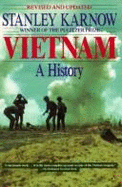25 must read books - XIII
Vietnam: A History
The Vietnam war was the the most long fought war in our times though its roots lay at least three centuries back. A subject so vast is very difficult to cover in one volume. The author has made an credible attempt in doing that. This is one book that I selected to understand the background behind Vietnam war for independence.
Stanley Karnow's "Vietnam: A History," provides a decent overview of the history of this country -- dominated for so long by China and then France -- as well as the Vietnam War, and the quagmire that the U.S. involvement became. One reason for Karnow's unique perspective is his involvement as a reporter before, during and after the war, and his incredible access to some of the principles, including North Vietnamese.
Perhaps the most interesting part of the book is the first chapter in which Karnow discusses the impact of the war over future foreign policy, and presents diverse opinions of military specialists who do some Monday morning quarterbacking. Obviously, the easy answer is that the U.S. should never have gotten involved in this part of the world at all. But the best and the brightest, at that point in history, unwaveringly believed in the so-called "domino theory," where one country after another would be over taken by Communism. A stand had to be made, according to almost all of these experts (with almost unanimous agreement in Congress), in South Vietnam. Also, the best military minds were of the opinion that sustained air strikes and a policy of "escalation" would eventually bring the North to their knees, which turned out to be one of the most militarily and costly mistakes the U.S. ever made. It certainly didn't help matters that the South Vietnamese, mostly comprised of uneducated peasants (same as the North) were heavily infiltrated by the Vietcong.
Perhaps the most interesting part of the book is the first chapter in which Karnow discusses the impact of the war over future foreign policy, and presents diverse opinions of military specialists who do some Monday morning quarterbacking. Obviously, the easy answer is that the U.S. should never have gotten involved in this part of the world at all. But the best and the brightest, at that point in history, unwaveringly believed in the so-called "domino theory," where one country after another would be over taken by Communism. A stand had to be made, according to almost all of these experts (with almost unanimous agreement in Congress), in South Vietnam. Also, the best military minds were of the opinion that sustained air strikes and a policy of "escalation" would eventually bring the North to their knees, which turned out to be one of the most militarily and costly mistakes the U.S. ever made. It certainly didn't help matters that the South Vietnamese, mostly comprised of uneducated peasants (same as the North) were heavily infiltrated by the Vietcong.
Stanley Karnow, born in New York City in 1925, served in the U.S. army in the China - Burma - India Theatre during World War II, graduated from Harvard and attended the Sorbonne and the Ecole des Sciences Politques in Paris. He began his journalistic career in Paris in 1950 as a Time correspondent. He went to Asia for Time and Life in 1959 and subsequently reported from there for The Washington Post. He was a correspondent for the Saturday Evening Post, the London Observer and NBC News. Mr Karnow won the Pulitzer Prize in history for his book In Our Image. He served as chief correspondent for the series "Vietnam: A Television History," for which he won six Emmys and shared in the Dupont, Peabody and Polk Awards.
Namaste
Prabir
Namaste
Prabir



No comments:
Post a Comment